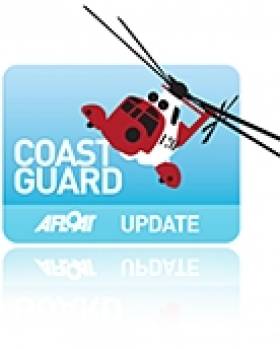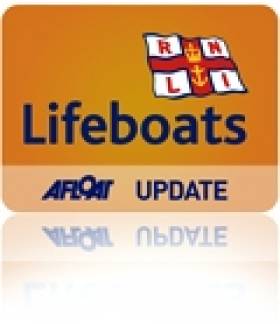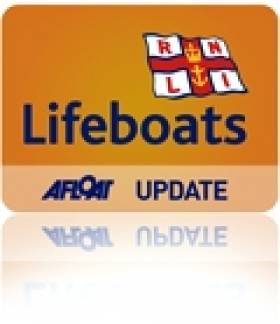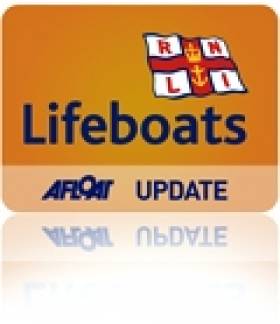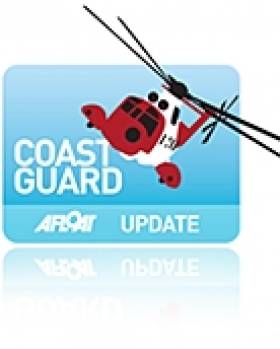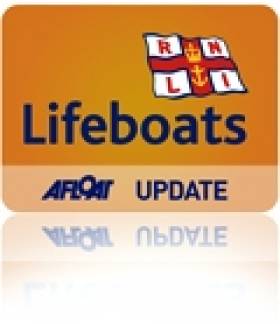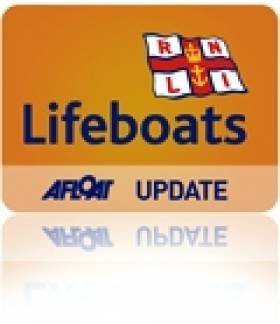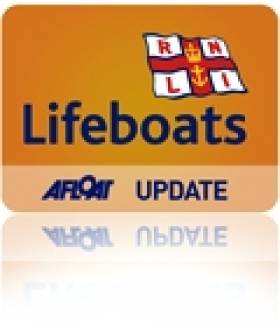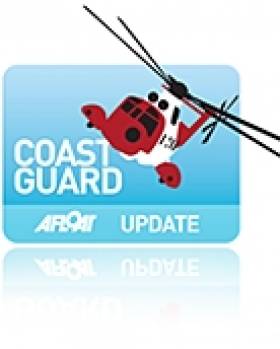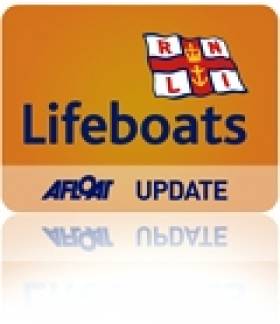Displaying items by tag: Lifeboat
Howth Coastguard and Lifeboat Rescue Teenager
The teenager had walked down a 100 foot steep cliff path to Jameson Beach on Howth Head with her friends when she collapsed. Gardai arrived on the scene and requested Coast Guard assistance to 'extract the female'.
The Howth Coast Guard Cliff Rescue Team were paged and arrived quickly at the scene. Medical care was given by the team, the casualty who was suffering from the cold was stabilised and placed in a stretcher for evacuation. Due to the terrain the quickest way to extract the casualty was via boat. Howth lifeboat quickly responded and the casualty was transferred back to the lifeboat station to a waiting ambulance.
The Coast Guard remind people that if they see someone who needs help on a beach to phone the new European wide emergency phone number, 112, and ask for the Coast Guard.
Dun Laoghaire Lifeboat Station Appoints Chairman
The role of LMG is to co-ordinate the various roles of the RNLI's work in the area, from fund-raising to sea-safety awareness, publicity and the vital role carried out by the two lifeboats and their volunteer crews that are based at the station.
"My role will be to help the LMG to deliver the best possible outcome for each of our activities," said Mr. Johnson. "Considering we are a volunteer-based charity, our goal remains to consistently deliver high-standards comparable with other professional services."
A well-known Dublin Bay and offshore racing sailor, Mr. Johnson is a member of Royal Ocean Racing Club and was the Irish team-manager for the 1987 Admiral's Cup. He now spends time cruising on 'Nyabo' and his sons and grandsons are also keen and competitive sailors.
The tradition of lifeboats in Dublin Bay pre-dates the foundation of the RNLI in 1824 and the modern-era service regularly counts the Dun Laoghaire station amongst the busiest in the Irish division. A Trent-class all-weather lifeboat (ALB) 'Anna Livia' and smaller D-Class inshore lifeboat (ILB) are based in the harbour with a crew-panel of 28 local men and women supported by shore-crew and fund-raising volunteers.
On 30th April 2011, a new D-Class ILB will be formally named and handed-over to the station.
Related Safety posts
RNLI Lifeboats in Ireland
Safety News
Rescue News from RNLI Lifeboats in Ireland
Coast Guard News from Ireland
Water Safety News from Ireland
Marine Casualty Investigation Board News
Marine Warnings
Dramatic Photos of Clifden Lifeboat Battling Surf
John organised the training in response to the increased popularity of the area with surfers. RNLI Divisional Assessor Trainer Helena Duggan travelled to the lifeboat station to put 18 volunteer lifeboat crew through their paces and train them in handling the lifeboat in surf and responding to potential callouts from leisure marine enthusiasts.
Training is a core part of volunteering with the RNLI and each crewmember in Clifden trains once a fortnight on the stations two inshore lifeboats.
Commenting on the exercise John said, "I took my camera down to photograph the exercise and was really pleased with the results. It is great to be able to show the public what our lifeboat volunteers go through to ensure they are fit and trained to go to sea. We had a fantastic turnout on the day and the lifeboat crew learned about boat handling in surf conditions. We are delighted so many people are visiting the area for leisure marine activities."
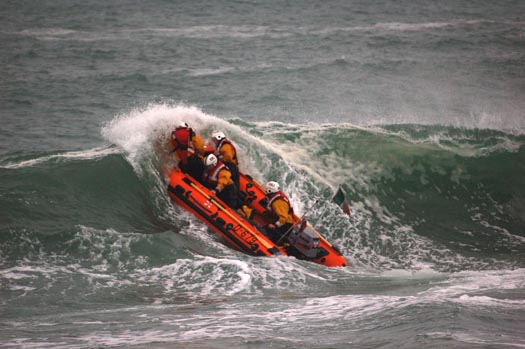
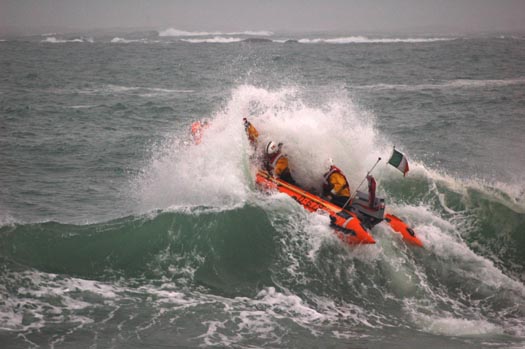
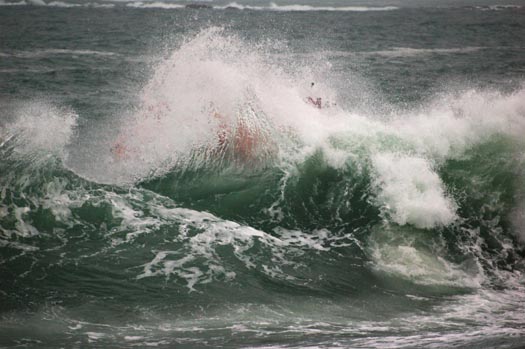
Photos by John Brittain/Clifden RNLI show Clifden volunteer lifeboat crew with RNLI Training assessor Helena Duggan during surf training on Dunloughan beach, Ballyconeely
Related Safety posts
RNLI Lifeboats in Ireland
Safety News
Rescue News from RNLI Lifeboats in Ireland
Coast Guard News from Ireland
Water Safety News from Ireland
Marine Casualty Investigation Board News
Marine Warnings
Howth Lifeboat Rescues Three Vessels
The Inshore Lifeboat (ILB) was just returning to the safety of the harbour with two motorboats in tow, when the larger All Weather Lifeboat (ALB) was requested to the aid of a fishing trawler that had also experienced technical failure.
The second motorboat under tow by the voluntary ILB crew suffered engine failure whilst attempting to assist the first stricken craft. They had just reached the harbour mouth when the alarm was raised by a fishing trawler in similar circumstances.
The voluntary crew then transferred to the ALB and went to the rescue of the fishermen. All vessels were towed safely back to Howth harbour.
Patrick Brown, voluntary crewmember for Howth RNLI said:
"Luckily weather conditions were fair this evening, allowing for a speedy recovery of the boats that were in difficulty. However the light was fading at the time of the incidents, highlighting the importance of having safety flares for both commercial and pleasure craft alike. Charitable donations from the public make it possible for the RNLI to continue rescuing those in danger at sea"
Related Safety posts
RNLI Lifeboats in Ireland
Safety News
Rescue News from RNLI Lifeboats in Ireland
Coast Guard News from Ireland
Water Safety News from Ireland
Marine Casualty Investigation Board News
Marine Warnings
Missing 18-Year Old Found After Two Hour Search in Bangor
The call came in at 23.40 from a member of the marina staff after the boy's two friends had told him that all three of them had climbed over the gate into the pier, but that their friend had not come back and they were concerned that he must have fallen into the water.
Belfast Coastguard sent the Bangor Coastguard Rescue Team to begin a search, as well as requesting the launch of the Bangor RNLI lifeboat. Members of the Police, Ambulance and Fire Service are also on scene.
At 01.50, the boy was found hiding in a compartment in the crew accommodation of a fishing vessel near the pier, and the search was stood down.
Belfast Coastguard Watch Manager Alan Pritchard said:
"This group of three boys had been at a birthday party in the town before climbing the gate this evening to access the pier. Incidents such as these remind of us of the dangers of being in proximity to the water when you have been drinking alcohol – be it going swimming, or walking along cliffs or piers. Although on this occasion the boy has been found safe and well, this could easily have been a much more serious incident."
Bangor Lifeboat Reunite Missing Child with Parents
Belfast Coastguard received the initial call for help and requested RNLI Bangor Lifeboat to launch immediately and start searching the shoreline between Lukes Point and Ballyholme Bay.
Within minutes of the rescue pagers being activated volunteer crew at RNLI Bangor Lifeboat had assembled and launched the lifeboat.
Knowing that this type of rescue was time critical, volunteer crew not on board the lifeboat proceeded on foot and by bike to the Ballyholme Bay area.
Thankfully one of the RNLI volunteers on shore spotted the young boy ½ mile from the initial search area and was able to reunite him with his parents.
Peter Semple the volunteer crew member who found the young boy said. 'We are extremely happy and relieved that the young boy has been found'. He added 'We were delighted to reunite him with his parents'.
Related Safety posts
RNLI Lifeboats in Ireland
Safety News
Rescue News from RNLI Lifeboats in Ireland
Coast Guard News from Ireland
Water Safety News from Ireland
Marine Casualty Investigation Board News
Marine Warnings
Crosshaven Lifeboat Recover Body in Ringabella Bay
Crosshaven RNLI Lifeboat report that they have recovered the body of a missing fisherman from the sea at Ringabella Bay after information received from a person on shore. The fisherman was lost when the fishing boat sank almost four weeks ago.
Related Safety posts
RNLI Lifeboats in Ireland
Safety News
Rescue News from RNLI Lifeboats in Ireland
Coast Guard News from Ireland
Water Safety News from Ireland
Marine Casualty Investigation Board News
Marine Warnings
Lough Derg Lifeboat Assists Yacht
Whilst on exercise on Sunday morning February 6, the Lough Derg Lifeboat, with helm Peter Clarke, Owen Cavanagh and Ger Egan on board, was requested to go to the assistance of four persons on board a 26ft sailing yacht that got into difficulty in strong winds in Dromineer Bay. Winds were south-westerly, Force 6 with a large swell.
The lifeboat came alongside the casualty vessel at 11.09hrs and found that two of the yacht's crew had been taken onto another vessel. The yacht, which had grounded in shallow water, was listing to starboard. With an RNLI crew member on board, the yacht was taken off the shallows at 11.20hrs and towed to the safety of the public harbour in Dromineer. RNLI lifeboat helm, Peter Clarke, said that "given the wind and lake conditions it was a challenging enough rescue and speed and efficiency was paramount."
The lifeboat returned to station and was ready for service again at 12mid-day.
Related Safety posts
RNLI Lifeboats in Ireland
Safety News
Rescue News from RNLI Lifeboats in Ireland
Coast Guard News from Ireland
Water Safety News from Ireland
Marine Casualty Investigation Board News
Marine Warnings
Flare Sightings Prompt Kilkeel Search
The first sightings of the red flares came in at 18.10 via 999 calls from members of the public reporting that they had seen the flares near the mouth of the Lough, southwest of Kilkeel. Belfast Coastguard issued a relay broadcast to vessels in the area to try and find more information about the potential vessel in distress, and three fishing vessels responded to say that they too had sighted the flares.
Belfast Coastguard then sent the South Down Coastguard Rescue Team, Kilkeel RNLI Inshore Lifeboat and the Irish Coast Guard Helicopter to the scene to begin a search. The three fishing vessels who responded to the initial broadcast also maintained a lookout during this time. The search area was approximately five and a half miles, and three miles offshore, and the search was completed at 20.30 and all resources stood down with nothing found.
Belfast Coastguard Watch Manager Rob Steventon said:
"With good visibility on scene and the search area completely saturated we are satisfied that the red flare sightings were not from a vessel in distress. All sightings of distress flares reported to the Coastguard have to be thoroughly investigated, however a proportion of these turn out to be either Chinese lanterns, or non distress situations, such as people disposing of out of date flares. Members of the public should be aware however, that using flares in a non-emergency situation is against the law."
Notes to Editors
Ballycotton Lifeboat Honours Mechanic
Michael has become well known throughout the RNLI community over the years and the 29 January was marked on several calendars for quite some time as the date they would be travelling to Ballycotton to help celebrate the retirement of an exceptional, modest man.
Lifeboat personnel travelled from RNLI lifeboat stations in Ballyglass Co. Mayo, Achill Island, Courtmacsherry, Rosslare, Helvic and Youghal joining with Ballycotton lifeboat members, family and friends to help celebrate a man's commitment to a job he treated more as a vocation than a job. The Training Divisional Inspector, Owen Medland and Divisional Base Manager, Derek Potter from the RNLI head quarters in Dublin attended and spoke of their long association with Michael Lane Walsh. Several presentations were made with the good wishes from everyone present, along with those from lifeboat crewmembers who were unable to leave their stations. Derek Potter told those present that normally they would be presenting a long service vellum to the retiree but in Michael's case he is not finished yet. For the time being he will not be hanging up his life jacket but will keep it in readiness for the next time someone calls for help from the Ballycotton RNLI lifeboat.
Related Safety posts
RNLI Lifeboats in Ireland
Safety News
Rescue News from RNLI Lifeboats in Ireland
Coast Guard News from Ireland
Water Safety News from Ireland
Marine Casualty Investigation Board News
Marine Warnings



























